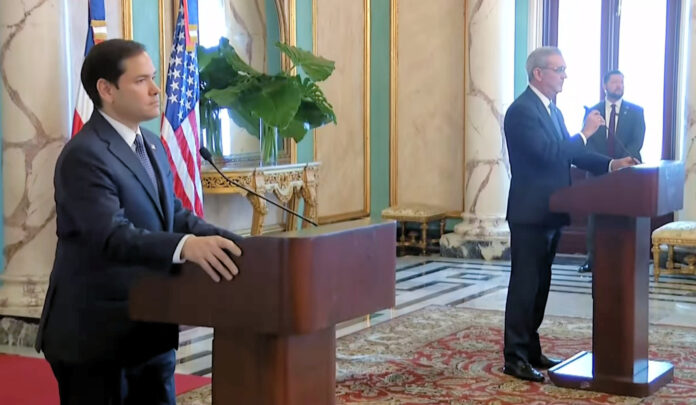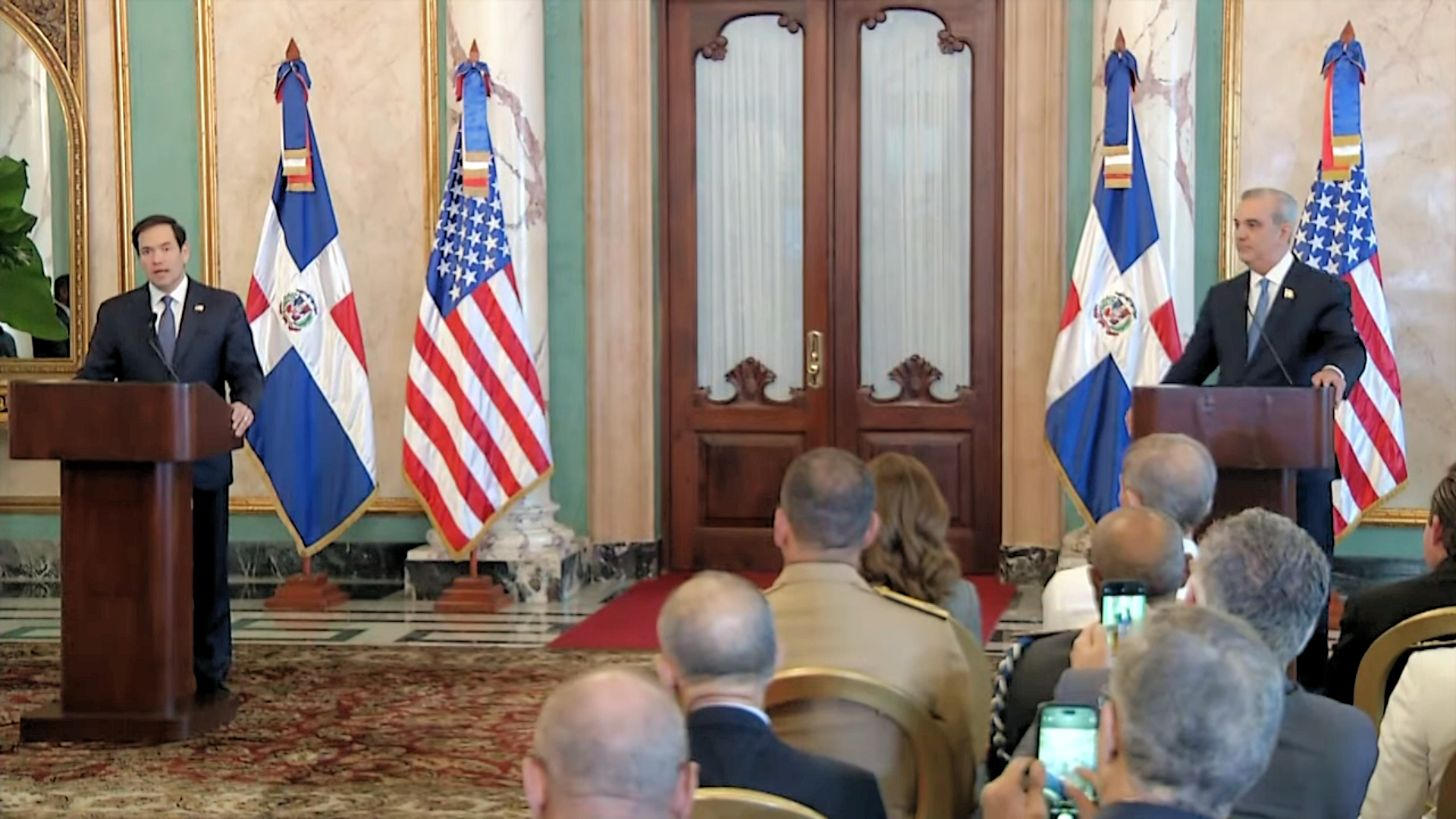
Leslie Voltaire, the rotating president of Haiti’s Transitional Presidential Council (TPC), last month flew to Rome to meet on Jan. 25 for 20 minutes with Pope Francis. Voltaire requested this expensive mini-visit, he said, for the following reason: “The Church has a lot of influence with many non-governmental organizations. It can also convince Latin American churches to come to the aid of Haiti.”
This comic, wasteful episode is the epitome of the old Kreyòl proverb: “He is so desperate that he doesn’t know what Saint to pray to!”
After this stunt, it is therefore no surprise that President Donald Trump’s new Secretary of State, Marco Rubio, didn’t even bother to visit with Voltaire and the TPC after he stopped in the Dominican Republic on Feb. 6 during his inaugural four nation tour of Latin America early this month.

In a joint press conference with Dominican President Luis Abinader, Rubio clarified the Trump Administration’s posture towards Haiti. He began by saying that “the future of Haiti belongs to the people of Haiti, and they and the elites of that society have to make up their minds and think through what they want their future to look like… But we are going to help.” Then he went on to call for continuation of the Multinational Security Support (MSS) mission, even though the U.S. froze its contributions to this mercenary force on Feb. 4.
“There has been some misreporting about the U.S. role in support of the mission there,” Rubio said. “So let me be clear… Last week, I signed a waiver to make sure that our programs there continue…” It is noteworthy that Rubio seemed to call the MSS one of Washington’s “programs.”
Rubio went on to say that he had spoken to Kenyan President William Ruto by telephone that morning, and “we appreciate that nation’s willingness to stand up and lend security forces.”
“This mission, as it is currently constructed, will not be enough. It needs to find new direction”
“This mission,” he continued, “as it is currently constructed, will not be enough. It needs to find new direction in order to be successful in rooting out these armed groups that today have taken possession of large portions of Haitian territory and endanger the lives of people and the stability of the region.”
Of course, the last words of that statement were music to Abinader’s ears. “We agree that there is no time to lose, Mr. Secretary,” Abinader said. “The Haitian situation is a threat to the security of the entire region [our emphasis], including that of the United States… We also stressed the importance of restoring humanitarian aid in order to avoid a worsening of the crisis and a possible uncontrollable wave of migration that would affect both the Dominican Republic and the United States.”
This has been the constant refrain of Washington and Santo Domingo: that Haiti is a “threat to international security.” Their frustration is that they have not been able to convince the UN Security Council of this fallacy, which would justify its deployment of a genuine “UN Peace-Keeping Operation.” In reality, the world can see that Haiti’s turmoil is a completely internal matter.

So Washington has had to settle for deployment of the MSS, which today amounts to less than 900 police/soldiers from Kenya, El Salvador, Guatemala, Jamaica, and Bahamas, all under the supervision of the principal “Core Group” embassies: the U.S., France, and Canada.
But this deployment has been largely ineffective until now. On Feb. 2, Haiti’s armed groups, recently united under the banner of the Viv Ansanm (Live Together) Political Party, were able to organize and celebrate pre-Carnaval festivities with large crowds, in Canaan, a sprawling slum north of the capital. However, on Feb. 8, the Haitian National Police (PNH) and MSS successfully intervened in the next town to the east, Croix-des-Bouquets, controlled by Wilson “Lanmò Sanjou” Joseph of the 400 Mawozo armed group, to destroy the stands and equipment prepared for a Carnaval celebration there. The PNH and MSS then carried out an operation against Vitel’Homme Innocent’s Kraze Baryè armed group on Feb. 9 in Tabarre, where they claim to have captured 15 handguns, 12 walkie-talkies, and arrested several of the group’s soldiers.
We are witnessing an historic uprising in Haiti. The popular masses have revolted against ruthless capitalist exploitation and the outrageous corruption of unelected public officials, which has left them in misery. The Western imperialist powers are united against Haiti’s popular struggle, but so far other conflicts around their empires – Ukraine, Gaza, Yemen, Lebanon, etc. – have prevented them from focusing their firepower on Haiti.
“There’s a real opportunity for Haiti to grow into a hub of near-shore light manufacturing”
But Marco Rubio made it implicitly clear that the Washington is still intent on integrating Haiti into its Global Fragility Act (GFA), passed in 2019 under Trump. If Washington can manage to get a puppet president elected this year, it would have their lackey sign the bilateral agreement which the GFA sets up. This accord would establish a U.S. military presence in Haiti for at least a decade and dump tons of U.S. surplus food on Haiti, destroying what remains of Haitian agriculture, thereby making the ever-shrinking Haitian peasantry flee to the cities to work in sweatshops which would replace those the U.S. is losing in China.
“There’s a real opportunity for Haiti to grow into a hub of near-shore light manufacturing,” Rubio said in the press conference. “That presence already exists there now. That can be expanded. They have a young and strong, vibrant work force… If we can deal with the security challenges, and pass legislation to give investors certainty about the future, we hope to see more investments that bring those industries from other continents [i.e. China] here to our hemisphere, shortening supply chains, and creating prosperity and opportunity for the people of Haiti.”
One other hurdle remains for Washington. The GFA, as written, is essentially a joint project of the Pentagon and USAID. Now that the latter has been dissolved, what will replace it?
For the moment, the Haitian people have managed to keep the new “American Plan” at bay, but much greater challenges lie ahead. Only a permanent mobilization and larger, stronger organization of the popular masses can resolve the political and economic crisis, restore security in Haiti, and thwart the GFA’s implementation in Haiti. A vanguard must work tirelessly to organize the popular masses and raise their awareness. Social networks can facilitate the task. Online philosophical and ideological training sessions, online discussions, exchange groups on digital platforms do not require large financial outlays. Technology can help advance the political struggle in Haiti, because all the objective conditions for revolution have been met. Let’s roll up our sleeves and get to work!
No to the MSS!
No to the military occupation of Haiti.
No to the Global Fragility Act.
Let us unite for Haiti’s national liberation struggle.
Liberty or Death!










[…] As Voltaire Prays to Pope for Haiti’s Deliverance , Marco Rubio Confirms the U.S. Empire’s Conti… Haiti Liberte […]
This info is invaluable. How can I find out more?